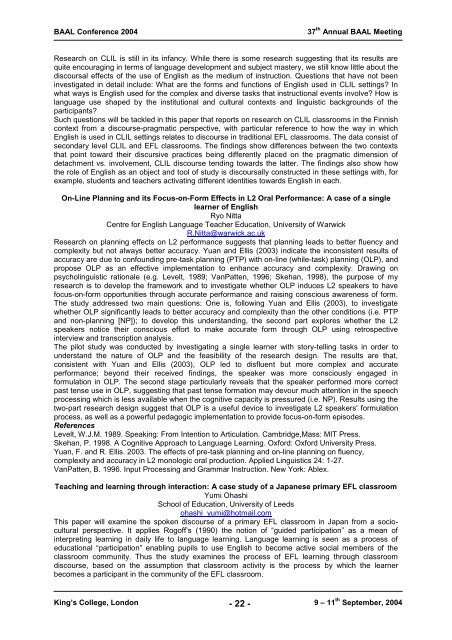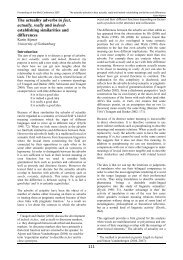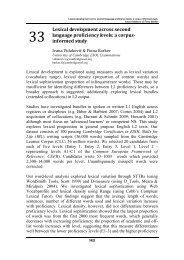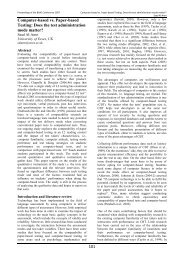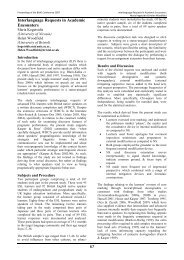Colloquia - British Association for Applied Linguistics
Colloquia - British Association for Applied Linguistics
Colloquia - British Association for Applied Linguistics
Create successful ePaper yourself
Turn your PDF publications into a flip-book with our unique Google optimized e-Paper software.
BAAL Conference 2004 37 th Annual BAAL Meeting<br />
Research on CLIL is still in its infancy. While there is some research suggesting that its results are<br />
quite encouraging in terms of language development and subject mastery, we still know little about the<br />
discoursal effects of the use of English as the medium of instruction. Questions that have not been<br />
investigated in detail include: What are the <strong>for</strong>ms and functions of English used in CLIL settings? In<br />
what ways is English used <strong>for</strong> the complex and diverse tasks that instructional events involve? How is<br />
language use shaped by the institutional and cultural contexts and linguistic backgrounds of the<br />
participants?<br />
Such questions will be tackled in this paper that reports on research on CLIL classrooms in the Finnish<br />
context from a discourse-pragmatic perspective, with particular reference to how the way in which<br />
English is used in CLIL settings relates to discourse in traditional EFL classrooms. The data consist of<br />
secondary level CLIL and EFL classrooms. The findings show differences between the two contexts<br />
that point toward their discursive practices being differently placed on the pragmatic dimension of<br />
detachment vs. involvement, CLIL discourse tending towards the latter. The findings also show how<br />
the role of English as an object and tool of study is discoursally constructed in these settings with, <strong>for</strong><br />
example, students and teachers activating different identities towards English in each.<br />
On-Line Planning and its Focus-on-Form Effects in L2 Oral Per<strong>for</strong>mance: A case of a single<br />
learner of English<br />
Ryo Nitta<br />
Centre <strong>for</strong> English Language Teacher Education, University of Warwick<br />
R.Nitta@warwick.ac.uk<br />
Research on planning effects on L2 per<strong>for</strong>mance suggests that planning leads to better fluency and<br />
complexity but not always better accuracy. Yuan and Ellis (2003) indicate the inconsistent results of<br />
accuracy are due to confounding pre-task planning (PTP) with on-line (while-task) planning (OLP), and<br />
propose OLP as an effective implementation to enhance accuracy and complexity. Drawing on<br />
psycholinguistic rationale (e.g. Levelt, 1989; VanPatten, 1996; Skehan, 1998), the purpose of my<br />
research is to develop the framework and to investigate whether OLP induces L2 speakers to have<br />
focus-on-<strong>for</strong>m opportunities through accurate per<strong>for</strong>mance and raising conscious awareness of <strong>for</strong>m.<br />
The study addressed two main questions: One is, following Yuan and Ellis (2003), to investigate<br />
whether OLP significantly leads to better accuracy and complexity than the other conditions (i.e. PTP<br />
and non-planning [NP]); to develop this understanding, the second part explores whether the L2<br />
speakers notice their conscious ef<strong>for</strong>t to make accurate <strong>for</strong>m through OLP using retrospective<br />
interview and transcription analysis.<br />
The pilot study was conducted by investigating a single learner with story-telling tasks in order to<br />
understand the nature of OLP and the feasibility of the research design. The results are that,<br />
consistent with Yuan and Ellis (2003), OLP led to disfluent but more complex and accurate<br />
per<strong>for</strong>mance; beyond their received findings, the speaker was more consciously engaged in<br />
<strong>for</strong>mulation in OLP. The second stage particularly reveals that the speaker per<strong>for</strong>med more correct<br />
past tense use in OLP, suggesting that past tense <strong>for</strong>mation may devour much attention in the speech<br />
processing which is less available when the cognitive capacity is pressured (i.e. NP). Results using the<br />
two-part research design suggest that OLP is a useful device to investigate L2 speakers' <strong>for</strong>mulation<br />
process, as well as a powerful pedagogic implementation to provide focus-on-<strong>for</strong>m episodes.<br />
References<br />
Levelt, W.J.M. 1989. Speaking: From Intention to Articulation. Cambridge,Mass: MIT Press.<br />
Skehan, P. 1998. A Cognitive Approach to Language Learning. Ox<strong>for</strong>d: Ox<strong>for</strong>d University Press.<br />
Yuan, F. and R. Ellis. 2003. The effects of pre-task planning and on-line planning on fluency,<br />
complexity and accuracy in L2 monologic oral production. <strong>Applied</strong> <strong>Linguistics</strong> 24: 1-27.<br />
VanPatten, B. 1996. Input Processing and Grammar Instruction. New York: Ablex.<br />
Teaching and learning through interaction: A case study of a Japanese primary EFL classroom<br />
Yumi Ohashi<br />
School of Education, University of Leeds<br />
ohashi_yumi@hotmail.com<br />
This paper will examine the spoken discourse of a primary EFL classroom in Japan from a sociocultural<br />
perspective. It applies Rogoff‟s (1990) the notion of “guided participation” as a mean of<br />
interpreting learning in daily life to language learning. Language learning is seen as a process of<br />
educational “participation” enabling pupils to use English to become active social members of the<br />
classroom community. Thus the study examines the process of EFL learning through classroom<br />
discourse, based on the assumption that classroom activity is the process by which the learner<br />
becomes a participant in the community of the EFL classroom.<br />
King‟s College, London 9 – 11 th - 22 -<br />
September, 2004


